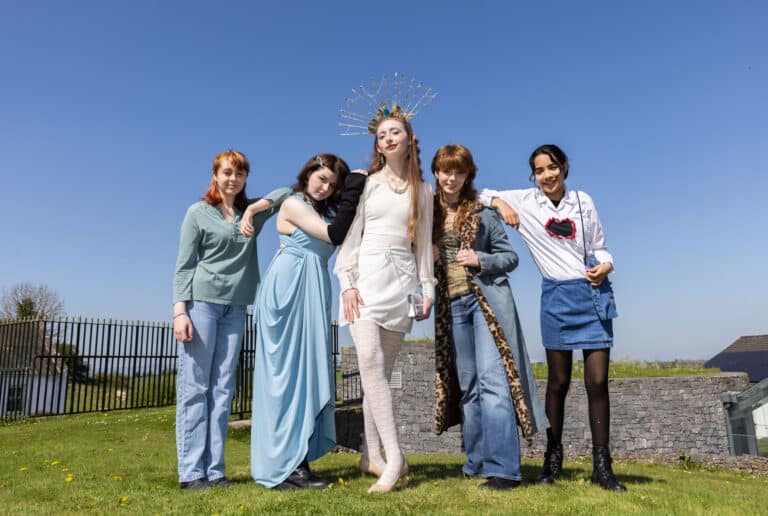

Let’s Fix Fashion is an education-focused campaign empowering young people to tackle the impacts of fast fashion. Through workshops, webinars, clothes swaps, and a final student catwalk, the programme raises awareness of fashion waste while promoting sustainable choices and circular economy principles. Through interactive webinars, presentations from Irish sustainable businesses, and their own research, students learn about the global environmental and social impacts of the fashion industry. The Let's Fix Fashion campaign inspires the next generation of changemakers to rethink how we make, wear, and dispose of clothes.
No, this programme is open to anyone who is interested in finding out about the negative impacts of the fashion industry on our planet, and what we can do to slow down fashion: create less waste, use more sustainable materials, improve working conditions etc. We welcome those who are passionate about creating change!
The Green-Schools Let’s Fix Fashion Project is open to students in schools that are actively working on any Green-Schools theme in the participating Local Authority Areas (listed below). The project is currently accepting applications for this school year and we would love to hear from you!
Participating Local Authority areas:
Each year the campaign is launched with a documentary screening within the school and live panel discussion during Climate Action week. Students will then focus on one aspect of the problem, inspired by the documentary and create a communications project around their message to raise awareness within their school. Below you will find resources to support this stage of the campaign.
Some of our past screenings include: A True Cost, A Textile Mountain and Fashion Reimagined and Inside the Shein Machine.
In 2025-2026 we are introducing an exciting new webinar called ‘Fashion, Culture and Me’ and resource to the programme for a new November webinar. Stay tuned for updates!
The third webinar will focus on Upcycling, where students are briefed and trained in a selection of skills that will help them to upcycle one item of clothing into multiple items. See below for our past Upcycling webinars.
The fourth webinar focuses on the Circular Economy where you and your students will have an opportunity to meet and engage with Irish sustainable businesses supporting the circular economy. In the past we have been delighted to work with incredible organisations like Sampla and Mamukko.
The fourth and final webinar focuses on the importance of sharing and pro-longing the life of our clothes! “One mans trash is another mans treasure!”
All of the webinars, workshops and activities culminate in our annual Catwalk Event at Bru Boru, Cashel.

Click on the image to download.
The ‘Welcome to your Let’s Fix Fashion Journey’ resource will give your students an insight into the environmental and social problems associated with Fast Fashion.
In the ‘Fast Fashion and the Global Goals: Stitching Sustainability into Our Future’ resource, you can learn about how ‘Fast fashion’ is a significant global challenge, negatively affecting multiple Global Goals such as poverty, health, gender equality, clean water, decent work, and climate action.
‘Global Threads: The Journey of Fast Fashion’ is a comprehensive resource exploring the journey of our clothing, from sourcing raw materials to their final destination. The interactive maps include videos and articles showing the processing of raw materials, production lines and landfill sites across the world.
This resource explores all our options for keeping our clothes in circulation for longer. By shopping second hand you’re giving clothes a longer life, slowing down fast fashion, and helping to protect our planet.
This resource explores how what we wear affects marine life, aquatic ecosystems, and coastal communities. Students will investigate the link between fast fashion and marine litter – from plastic microfibres in the sea to clothing dumped in the Global South.
This resource takes a look at the circular economy and fast fashion. We also highlight some wonderful sustainable Irish businesses.
A circular economy aims to maintain the value of products, materials and resources for as long as possible by returning them into the product cycle at the end of their use, while minimising the generation of waste. It designs out waste restoring and regenerating nature extending the lifespan of textiles. The circular economy tackles climate change and biodiversity loss together while addressing social needs.
We encourage all schools involved in the programme to run their own clothes sharing, or swap shop, event.
Schools that actively participate in the project throughout the year will be entered into a draw to take part in a live end of year catwalk event where students will be given vouchers to purchase and put together outfits from second hand clothing stores. Participating schools will be awarded a certificate of completion.
Did you know that #LetsFixFashion has its own Instagram?
Follow us for events, announcements, knowledge shares and more! @gs_letsfixfashion
And don’t forget to check out our #LetFixFashion Youtube playlist for past workshops and other resources.
